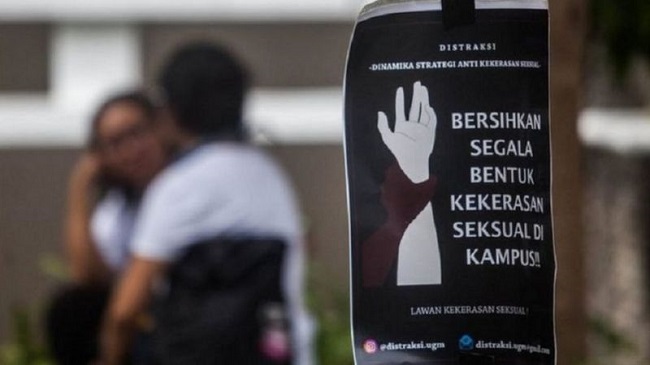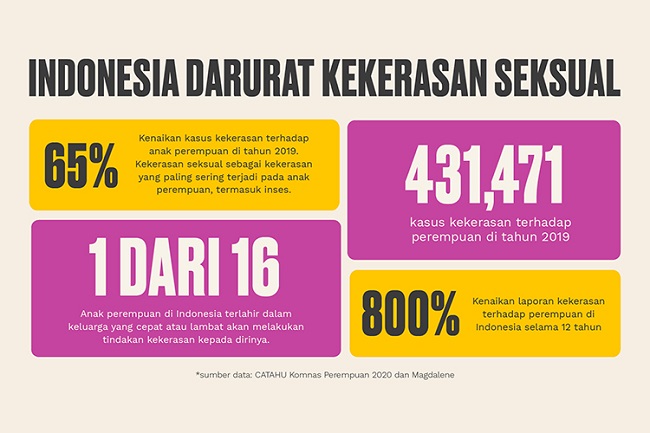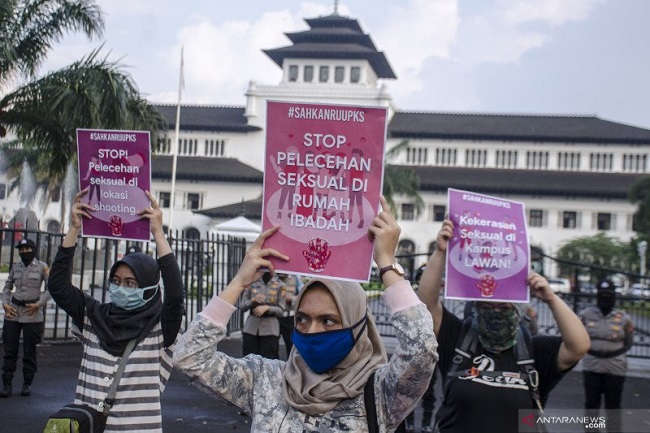Education Minister Nadiem Makarim’s recent acknowledgement of a ‘sexual violence pandemic’ on the nation’s campuses follows a growing wave of victims speaking out and not without risk
Andi Misbahul Pratiwi & Nikodemus Niko
Reports of sexual violence in Indonesia are increasing rapidly. The National Commission on Violence Against Women (Komisi Nasional Anti Kekerasan terhadap Perempuan or Komnas Perempuan) received 4898 reports of sexual violence in 2019. The spectrum of sexual violence is extensive, including (but not limited to) rape, forced abortion and contraception use, sexual exploitation, incest and also sexual violence in cyberspace. Data show that sexual violence cases occur throughout the population affecting women (including elderly women), men, children, people with disabilities and members of minority groups.
In public spaces, women bear the brunt of sexual violence. A 2019 survey by the Coalition for Safe Public Space (Koalisi Ruang Publik Aman, KRPA) found that the prevalence of harassment in public spaces against women is much higher than for men. Three out of five women have experienced harassment in public spaces, compared to one out of ten men. Even though women are much more likely than men to be victims, we must remember that men can also be victims of sexual violence.
When sexual violence cases are made public, Indonesia’s legal system is limited in how it can address these issues. This is evident in the number of people who are sharing their experiences of sexual violence on social media platforms – often referred to as ‘spilling the tea’. Becoming viral is now a way for some people to seek justice. However, it doesn't guarantee they get justice and, in some cases, sexual violence victims and survivors face backlash after sharing their stories.
Spilling the tea culture
‘Spilling the tea’ or membocorkan fakta (literally ‘leaking the facts’) is the act of sharing a story which contains rumours, information, or personal experiences. Someone can ‘spill their tea’ by creating a long thread on Twitter in order to attract public attention. Spilling the tea has become popular, especially in sexual violence cases that relate to public figures, powerful men, organisations or institutions. The massive campaign #NamaBaikKampus (#CampusReputation) is one example of this, where students who experienced sexual violence at their universities, voiced their concerns, seeking justice and support via digital media. These cases were able to bring attention to sexual violence, triggering widespread discussion and empowering other victims to speak up.
Even though spilling the tea is an alternative way to resist, it also poses a high risk. Baiq Nuril’s case (2018) and the current KPI staff case (2021) are two examples of this. Baiq Nuril, a 41-year-old bookkeeper and mother of three, was allegedly receiving sexually-suggestive phone calls from the head teacher at the school where she worked. She began recording his calls and her friend shared them online without Baiq’s permission. In 2018, the recordings went viral on social media. Baiq Nuril was jailed under Indonesia’s Electronic Information and Transactions (EIT) Law (No 11/2008).
Another case of sexual violence and bullying that has received attention involves a male staff member at the Indonesian Broadcasting Commission (Komisi Penyiaran Indonesia or KPI). This staffer had been bullied and sexually harassed since 2011 by an office colleague. He reported the harassment to the police several times in 2019 and 2020, but there was no a serious response. In 2021, he decided to share his stories and the chronology of his case via his Facebook account. His story was re-shared by many people, receiving public and government attention after a related Twitter thread went viral and the KPI launched an internal investigation into the case. Unfortunately, the victim was threatened under the EIT law by the alleged perpetrator and forced to rescind his allegations. Cases like these show that sexual violence victims and survivors still face challenges in seeking justice.

Spilling the tea is also a privilege since not all victims and survivors have access to technology, legal aid, public endorsement or even personal data protection. Some of these stories succeed in gaining public attention and lead law enforcement to process the case. But other stories go under the radar as there is no guarantee that the thread will go viral. Furthermore, instead of getting public sympathy, some victims and survivors are stigmatised, labeled, bullied and targeted which creates additional trauma. Spilling the tea does not always lead to a happy ending and it does nothing to solve the root of the problem.
Sexual violence policy and its challenges
Regulations against sexual violence remain limited. The Indonesian Criminal Code (KUHP) only recognises rape and lewd crimes, while sexual violence cases are varied and can transform rapidly from offline (face-to-face) to the online space. The focus is on punishing the perpetrators, with no restitution for victims and the code does not consider the best socio-legal remedies for victims and survivors. Specifically, in rape crimes, the Indonesian Criminal Code only recognises the actions of men who use violence or threats to force women into sexual acts. The law excludes sexual violence against and rape of men as a criminal act.
Since 2014, women’s movements, civil society and academics have pushed the House of Representatives to pass a bill on the elimination of sexual violence (Rancangan Undang Undang Penghapusan Kekerasan Seksual, RUU PKS) but the journey has not been easy. There has been ideological resistance and political back and forth on the issue. From 2014 to 2019, the process was stuck at stage one (discussion phase) in the national legislature. In 2019, the process restarted and we are now, in 2021, at the bill drafting stage. Proposals for the bill seek to criminalise all forms of sexual violence and offer justice to all victims, no matter their gender.
A meeting on 30 August 2021 suggested that the draft bill will be watered down. The Legal Aid Institute in Jakarta notes there are 16 important issues with diminished attention, meaning that many crucial points will not be included in the revised draft. These include a narrowing in the definition of sexual violence (from nine types down to only four) and limitations to the obligation of the Integrated Service Centre to protect and fulfill the victim’s rights. This reduces the original spirit of the draft bill to provide restorative justice.
Despite all these reductions, Komnas Perempuan appreciated the progress and discussion about the draft bill but offered some critiques. It suggested:
- Improving the draft bill by taking into account the usefulness and effectiveness of the formulation of norms based on the victim’s experiences, especially their obstacles in accessing justice and in recovery
- Continuing to open the space for public aspirations especially for community groups that have been working directly with victims of sexual violence, particularly the victim and survivor community, as well as victims’ assistance agencies and legal aid agencies.
With all the procedural challenges to passing the bill, we should recognise the cultural challenges that affect how victims respond to their cases. One massive challenge is the social stigma they might face. Victims of sexual violence are often confronted by negative attitudes from other people in their lives, including their family and friends as well as netizens in this digital era. Although any victim and survivor of sexual violence can be stigmatised, there are differences in the nature of stigma based on the victim’s gender.
For women victims, people often ask biased questions such as ‘What clothes were you wearing?’, ‘Why didn't you scream?’ and ‘Did you give permission?’. When men are victims of sexual violence, their masculinity is questioned and they often face bullying, since there are harmful myths that men are unlikely to be raped or victimised. Men who are sexually assaulted are stigmatised as weak or gay if they were assaulted by a male; however, if they were assaulted by a female, then they might be criticised for not wanting to consent or not being able to defend themselves. People often ask why they didn’t fight back why they were weak.
Furthermore, social stigma also comes from law enforcement officers that have not received appropriate gender sensitivity training to deal with sexual violence cases. In parallel with the process of passing the bill on sexual violence, there is a need to increase public awareness that sexual violence is not about sex – it is about power and violence.

Sex and gender are factors that influence inequality in power relations, but they are not the only ones. There are links with other determining factors – such as social class, economic status, religion, race, ethnicity, skin colour and geography – that cannot be ignored. Therefore, victims, survivors and the public must work hand in hand to voice this issue and bring about meaningful change.
Future directions
Reflecting on these bitter facts, Indonesia urgently needs a comprehensive policy to address sexual violence. We need radical cultural and structural transformation to respond to these complex human issues. Government intervention should be based on evidence and empathy.
A bill for the elimination of sexual violence (RUU PKS) is a must and should provide legal certainty for all. That regulatory instrument must be followed by public education about sexual violence including for law-enforcement officers who will need to implement the law. The critical questions are: What is the government going to do to ensure that justice is available all victims of sexual violence? For how much longer will victims and survivors need to spill the tea on social media platforms, hoping for their posts to go viral?
Andi Misbahul Pratiwi (andi.misbahul@ui.ac.id) is a researcher at the Gender Research Center University of Indonesia. She has a masters degree from the Gender Studies Programme, University of Indonesia (2016–2018), and worked as managing editor of Jurnal Perempuan, an accredited feminist scientific journal in Indonesia, from 2015 to 2020. Nikodemus Niko (nikodemus15001@mail.unpad.ac.id), is a Doctoral Candidate in Sociology at the Postgraduate Program in Sociology, Faculty of Social and Political Sciences, Padjadjaran University. His research focuses on gender and sexuality, indigenous people and sociology.
